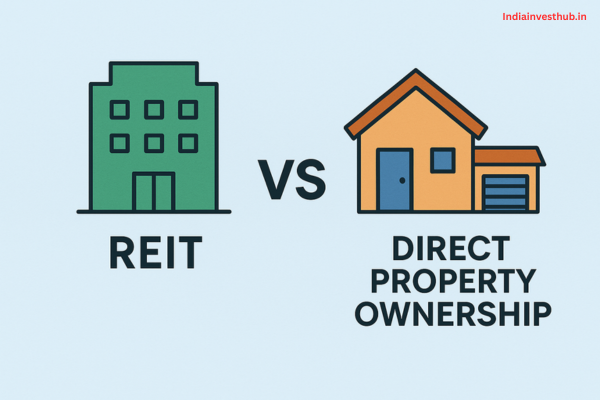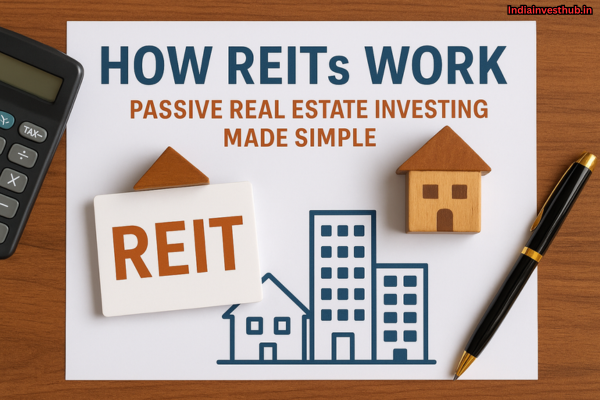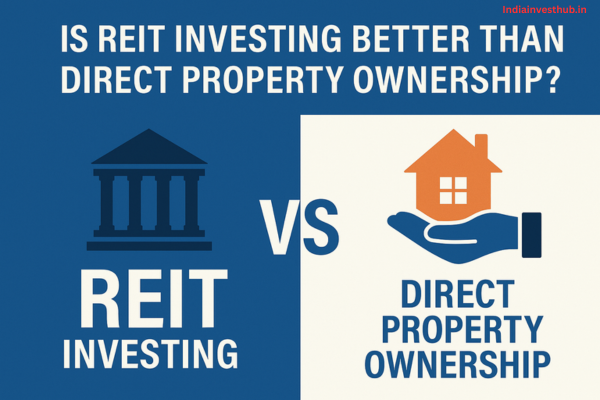REIT investing has started showing up in serious conversations among real estate investors, especially those who want exposure to property markets without buying a house or dealing with tenants. At the same time, direct property ownership still feels more “real” — you control the asset, decide the rent, make upgrades, and hold it for appreciation. Both paths create wealth in different ways, and choosing between them has become a key decision for investors exploring real estate today.
In India and globally, the rise of listed REITs has made it possible to invest small amounts and earn regular income through dividends. Meanwhile, property ownership continues to offer long-term capital gains when bought in the right location. Investors want to know whether REIT investing is better than direct property ownership, and the answer depends on risk profile, return expectations, liquidity needs, and investment horizon.
REITs vs Direct Property Investment: What Is the Real Difference?

A REIT pools investor money to own and manage a portfolio of income-producing real estate (offices, malls, warehouses, apartments, etc.). You buy shares of the REIT — similar to stocks — and receive income (dividends) from rental/lease income generated by the underlying properties. Ownership and maintenance are handled by the REIT’s management.
Direct property investment means you buy a physical asset — an apartment, house, commercial building or land — and you own it outright. You handle all decisions: renting, maintenance, repairs, tenant screening, and eventual resale or lease uplift.
When is the Best Time to Buy or Sell Property? A Look at Real Estate Market Cycles
How REITs Work: Passive Real Estate Investing Made Simple

With a REIT:
- You invest a relatively small amount compared to buying a full property.
- Ownership is fractional — you own a part of a much bigger diversified property portfolio.
- Rental income, maintenance, tenant risk, and vacancy risks are shared across the pool.
- Liquidity is high: you can buy and sell REIT shares on a stock exchange, often within minutes.
This makes REITs attractive for investors who prefer passive income, flexibility, and lower entry costs.
Direct Property Ownership Explained: Control, Appreciation & Rental Income
Buying property directly offers several advantages:
- Full control over the asset: you select location, tenant type, upgrades, rental terms.
- Potential for capital appreciation: as the city grows or infrastructure improves, value can rise significantly.
- Rental income — if rented out — can provide steady cash flow (or long-term wealth, if kept vacant for appreciation).
- Tax or loan strategies (in some countries) can work for ownership in ways that publicly traded REITs can’t match.
Direct ownership tends to suit those wanting hands-on control, long-term capital growth, and the pride of owning real estate.
Investment Returns: REIT Dividend Yields vs Rental Income From Properties
With REITs, returns typically come in two forms: dividend yield + NAV (net asset value) appreciation. Historically, publicly traded REITs globally have offered dividend yields around 4%–8% annually, plus moderate capital growth, depending on market cycles.
With direct property, yields depend heavily on location, property quality, demand, and management efficiency. In many urban Indian markets, gross rental yields (before costs) may range 2.5%–5.5%, and net yield less after maintenance, vacancies, tax, and expenses — though high-demand areas or co-living/student properties can push yields higher.
The result: REITs often offer steady, lower-volatility income and diversified risk, whereas direct ownership can deliver higher upside — but with more volatility and management burden.
Capital Growth Potential: REIT NAV vs Property Value Appreciation
REIT NAV growth is tied to the performance of the underlying real estate portfolio; good management, occupancy rates, and rental growth drive NAV upward, giving investors capital gains. Because portfolios are diversified across multiple properties and property types, REITs often avoid the volatility of a single property location.
Direct ownership carries the possibility of major appreciation — especially in growth corridors, upcoming infrastructure zones, or rapidly urbanizing cities. However, gains are concentrated in one asset, so risk (location risk, regulatory risk, demand shifts) remains higher.
Liquidity Comparison: Why REITs Are Easier to Buy and Sell
One of the biggest advantages of REITs is liquidity — you can buy or sell shares on the stock exchange almost instantly during market hours.
With direct property ownership, selling involves time-consuming tasks: finding buyers, legal paperwork, brokerage fees, property inspections, registration/custom duties (if applicable), and sometimes price negotiation over months. This makes property investments illiquid and less flexible.
For investors who value flexibility, quick entry / exit, and lower transaction friction, REITs often make more sense.
Risk Factors: Market Volatility vs Property-Specific Risks
REIT risks come from market-wide factors: economic downturn, interest-rate hikes, regulatory shifts, or real-estate sector slowdown — which can affect all properties in the REIT’s portfolio.
Direct property ownership carries property-specific risks: tenant default, maintenance costs, vacancy, localized economic downturn, infrastructure delays, regulatory or zoning issues, and illiquidity.
Thus, REITs spread risk across many properties, reducing exposure per asset; direct ownership puts all risk on a single asset.
Costs & Taxes: REIT Taxation vs Property Taxes and Maintenance Costs

With REITs:
- No maintenance, repairs, tenant handling, or regular oversight on your part.
- Dividend income often taxed like dividend or capital-gains income (depending on your jurisdiction).
- Reinvestment or sale is simply selling shares, not dealing with property transfer paperwork.
With direct property:
- You pay property taxes, maintenance, repairs, vacancy costs, brokerage on sale, renovation, ongoing upkeep, property management (if outsourced).
- Rental income is taxable (depending on local laws).
- Selling property involves transfer taxes, stamp duty, registration charges, brokerage etc.
These costs reduce net yield and add friction — something many new real-estate investors underestimate.
Diversification Power: REIT Portfolios vs One Property Exposure
REITs generally hold a diverse portfolio: multiple properties, varied asset classes (residential, commercial, retail, industrial), and different geographies. That reduces risk and smooths returns.
Direct ownership limits you to one property (or a small number) — high concentration of risk; if the neighborhood declines, or vacancy increases, your entire investment suffers.
If you want to build a broader diversified real-estate exposure with less capital and lower risk — REITs may be the better path.
Which Is Better for Different Investors? Investment Goals & Risk Profile
| Investor Profile / Goal | Better Option | Why |
|---|---|---|
| Small capital, wants passive income, prefers liquidity | REIT | Low entry cost, diversified holdings, easy to buy/sell |
| Long-term wealth building, high risk tolerance, hands-on control | Direct Property | Potential for high upside, control over asset, tangible ownership |
| Risk-averse, wants stable dividend income, minimal hassle | REIT | Portfolio diversification, no tenant/maintenance worry |
| Wants capital appreciation + control (renovation, upgrades, rental increases) | Direct Property | Full control over upgrades & rental terms |
FAQs – Is REIT Investing Better Than Direct Property Ownership?
Q1: Do REITs outperform direct property over time?
👉Often REITs provide steady yield and lower risk, but direct property can outperform — especially in high-growth areas — if managed well.
Q2: Can I combine both?
👉Yes — many investors use a hybrid strategy: a few direct properties for control/asset appreciation, plus REITs for diversification and liquidity.
Q3: What about short-term rental income?
👉Direct property gives more control over rent — but also more risk (vacancy, tenant issues). REITs offer lower but stable yields.
Q4: What if I’m based abroad (NRI)?
👉REITs offer easier compliance, liquidity, and less hassle than managing a physical property from abroad.
Conclusion:
If you value liquidity, diversification, low effort, and steady income, REITs offer a compelling solution. If you prefer control, potential high appreciation, and tangible ownership, direct property remains appealing. The “better” option depends highly on your capital, risk tolerance, investment horizon, and involvement level.
Many modern investors use a blend of both — maximizing yield, reducing risk, and balancing control with convenience.
Which path fits your investment goals best — REITs, direct property, or a balanced blend of both?





